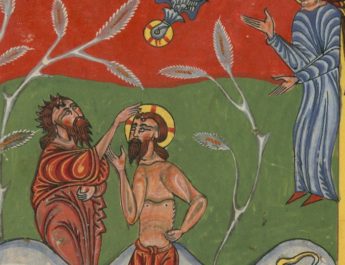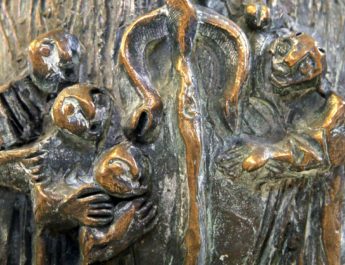Psalm 139:1-6, 13-18
Ordinary B8
To the leader.A Of David.B A Psalm.C
A “leader” = natsach. Properly, something that glitters from a distance. So, something that stands out, excels, has status/standing (such as a chief musician or superintendent of Temple services). This can also mean to be permanent or enduring.
B “David” = David. From the same as dod (beloved, love, uncle); the root may mean to boil, which is used figuratively to describe love. So, this implies someone you love such as a friend, a lover, or a close family member like an uncle. David’s name likely means something like “beloved one.”
C “Psalm” = mizmor. From zamar (making music; used specially of music to worship God; music with singing, singing praise, singing psalms); may be from zamar (to trim or prune). This is a melody or a psalm.
1 O Lord,D you have searchedE me and knownF me.
D “Lord” = YHVH. From havah (to be, become) or hayah (to come to pass, become, be). This is the name of the God of Israel, the self-existent and eternal one, the tetragrammaton. This pronunciation has been lost to time so “Lord” is generally used in its place.
E “searched” = chaqar. Properly, this means to penetrate. So, it means to thoroughly investigate, examine, ponder, or seek out.
F “known” = yada. This is to know, acknowledge, advise, answer, be aware, be acquainted with. Properly, this is to figure something out by seeing. It includes ideas of observation, recognition, and care about something. It can be used causatively for instruction, designation, and punishment.
2 You know when I sit downG and when I rise up;H
you discernI my thoughtsJ from far away.
G “sit down” = yashab. This is to sit and so to remain and so to dwell. It is sitting for any reason – as a judge, in order to ambush, or just sitting quietly. Causatively, this can mean settling or marrying. This can also mean continue, endure, or establish.
H “rise up” = qum. To arise, stand, accomplish, establish, abide. This is rising as in rising against, getting up after being sick or asleep, arising from one state to another, becoming powerful, or rising for action. It can also be standing in a figurative sense.
I “discern” = bin. This is to discern, consider, attend to. It refers to distinguishing things in one’s mind or, more generally, to understand.
J “thoughts” = rea. 2x in OT – both in Psalm 139. Perhaps from ra’ah (to tend a flock, pasture, or graze; to rule or to associate with someone; figuratively, ruler or teacher). This is a thought, purpose, or goal. Here, in the singular.
3 You search outK my pathL and my lying down,M
and are acquaintedN with all my ways.O
K “search out” = zarah. This is to scatter or toss around. It can imply to disperse, cast away, or to scrutinize.
L “path” = orach. From arach (to go, travel, wander). This is a road that is widely used, highway, caravan, traveler, troop.
M “lying down” = reba. 1x in OT. From the same as raba (to lie down, squat, breed). This is lying down as for sleep.
N “are acquainted” = sakan. 12x in OT. This is being customary, of use, of acquainted with.
O “ways” = derek. From darak (to tread, march, to walk. Can also mean affixing a string to a box since one needs to step on it to bend it in the process; so also an archer). This is a road as a thing that is walked on. Can be used figuratively for the path that one’s life takes or how one chooses to live one’s life.
4 Even beforeP a wordQ is on my tongue,R
SO Lord, you know it completely.
P Literally “for there is not.”
Q “word” = millah. From malal (to say, speak; often used in a poetic sense). This is something said – a word, speech, talking, or discourse.
R “tongue” = lashon. This is tongue, talker, language, or wedge. It can also be a tongue of flame or a water cove.
S {untranslated} = hen. This is a remark of surprise or excitement: lo! Behold! It can also mean if or though.
5 You hem me in,T behind and before,
and layU your handV upon me.
T “hem…in” = tsur. This is to confine, cramp, or bind in a literal or figurative sense. It can mean to besiege, assault, or distress.
U “lay” = shith. This is to place, set, bring, appoint, consider, bring, array or look.
V “hand” = kaph. From kaphaph (to bend – from a root meaning curve or bend down). This is palm of the hand or sole of the foot, footstep, grasp. Figuratively, it can also mean power.
6 Such knowledgeW is too wonderfulX for me;
it is so highY that I cannot attainZ it.
W “knowledge” = daat. Related to “known” in v1. From yada (see note F above). This is knowledge, unawares, cunning, wittingly.
X “too wonderful” = pili. 2x in OT. From the same as pele (wonder, miracle, wonderful, marvelous thing); perhaps from pala (to be extraordinary, to arise, to be great or accomplish). This is wonderful, remarkable, beyond understanding, secret.
Y “high” = sagab. This is to raise, lifted, high, set secure on high, excellent, or strong. It is inaccessibly high in a literal and figurative sense. It implies something that is safe and, therefore, something that is strong.
Z “attain” = yakol. This is to be able, endure, overcome, prevail.
13 For it was you who formedAA my inward parts;BB
you knit me togetherCC in my mother’sDD womb.EE
AA “formed” = qanah. This is to acquire, create, purchase, own. Its root may mean to smith or to produce.
BB “inward parts” = kilyah. Perhaps from keli (something that was prepared – any implement, utensil, article, vessel, weapon, or instrument; also includes jewels, weapons, bags, carriages, and furniture); from kalah (to end, be finished, complete, prepare, consume, spent, or completely destroyed). This is inward parts, such as kidney or heart. It can also be inmost being as feelings, mind, or within.
CC “knit…together” = sakak. This is to cover or overshadow. It could also be to hedge or fence it. Figuratively, this could be to defend, protect, or join together.
DD “mother’s” = em. This is a mother as binding a family together or a breeding female animal. It could be mother in a literal or figurative sense.
EE “womb” = beten. Root may mean to be hollow. This is the belly or womb. It can also refer to a body more broadly.
14 I praiseFF you, for I am fearfullyGG and wonderfully made.HH
FF “praise” = yadah. From yad (hand). This is to throw one’s hands into the air in a gesture of praise. So, it is to praise, give thanks, or make a confession.
GG “fearfully” = yare. This is to fear, be afraid, dreadful. It can also refer to fearful reverence – to fear in a moral sense is to say to revere, respect.
HH “wonderfully made” = palah. 7x in OT. This is to distinguish in a literal or figurative sense. It can also be to sever, set apart, or show self to be marvelous.
WonderfulII are your works;JJ
that IKK know very well.
II “wonderful” = pele. Related to “too wonderful” in v6. See note X above.
JJ “works” = maseh. From asah (to do, make, accomplish, become). This is a word – any action whether positive or negative. It can also be a transaction, construction, activity, property, or something that is produced.
KK “I” = nephesh. Related to naphash (to refresh or be refreshed). This is soul, self, person, emotion. It is a breathing creature. Can also refer to appetites and desires.
15 My frameLL was not hiddenMM from you,
when I was being madeNN in secret,OO
LL “frame” = otsem. 3x in OT. From atsam (vast, numerous, strong; to close one’s eyes, to make powerful; to break bones). This is bones, strength, power, body, substance, frame.
MM “hidden” = kachad. This is to hide or conceal or destroy. It can also refer to doing secret actions or secret speech.
NN “made” = asah. Related to “works” in v14. See note JJ above.
OO “secret” = sether. From sathar (hide, conceal, or be absent; hiding because something is covered – used in a literal or figurative sense). This is covering, shelter, protection, hiding place. It can be hidden by a mountain, by clouds, in the womb, in a matter of secrecy, through slander, or of nations.
intricately wovenPP in the depthsQQ of the earth.RR
PP “intricately woven” = raqam. 9x in OT – 8x in Exodus of materials for the tabernacle and priesthood & 1x in Psalm 139:15 of being “intricately woven in the depths of the earth.” This is to embroider, weave, vary color, fabricate.
QQ “depths” = tachti. 19x in OT. From tachat (underneath, below, the bottom, instead of). This is beneath, the depths, foot of a mountain, a pit, the womb.
RR “earth” = erets. Root may mean to be firm. This is earth, ground, field land, or country.
16 Your eyesSS beheldTT my unformedUU substance.
SS “eyes” = ayin. This is eye in a literal or figurative sense so eye, appearance, favor, or a fountain (the eye of the landscape).
TT “beheld” = raah. This is to see in a literal or figurative sense so stare, advise, think, view.
UU “unformed” = golem. 1x in OT. From galam (to wrap or fold together). This is an unformed mass or substance. This is also the word that the mythical creature “golem” gets its name from (but not the Tolkien character Gollum).
In your bookVV were writtenWW
all the days that were formedXX for me,
when none of them as yet existed.
VV “book” = sepher. Perhaps from saphar (to tally or record something; to enumerate, recount, number, celebrate, or declare). This is can be writing itself or something that is written like a document, book, letter, evidence, bill, scroll, or register.
WW “written” = kathab. This is to write, decree, describe, record.
XX “formed” = yatsar. Perhaps related to yatsar (to be narrow, distressed, or vexed); perhaps related to tsarar (to bind, restrict, narrow, be cramped, an adversary). This is to fashion or form, perhaps by squeezing something into a shape or form. Particularly, it is to create as a potter does. Figuratively, it is to determine.
17 How weightyYY to me are your thoughts, O God!
How vastZZ is the sumAAA of them!
YY “weighty” = yaqar. 11x in OT. This is to be precious, costly, rare, valued; properly, to be heavy; figuratively, valuable or inhibit.
ZZ “vast” = atsam. Related to “frame” in v15. See note LL above.
AAA “sum” = rosh. This may come a word that means to shake. It is the head, captain, or chief. It can also be excellent or the forefront. It can be first in position or in statue or in time (i.e. the beginning).
18 I try to countBBB them—they are moreCCC than the sand;DDD
I come to the endEEE—I am still with you.
BBB “try to count” = saphar. Related to “book” in v16. See note VV above.
CCC “are more” = rabah. This is increasing in any aspect whether quantity, authority, size, quality, greatness, etc.
DDD “sand” = chol. From chul (whirling around so dancing as in a circle or writhing in pain; used particularly for the pain of childbirth or from writhing due to fear; can also be falling in pain or waiting). This is sand, perhaps because of its roundness or the way that the grains can whirl.
EEE “come to the end” = quts. Related to qayits (fruit, harvest, dry season); from quts (summer, clip off). This is arise or watch. It is to awake in a literal or figurative sense.
Image credit: “with child” by carina, 2008.




